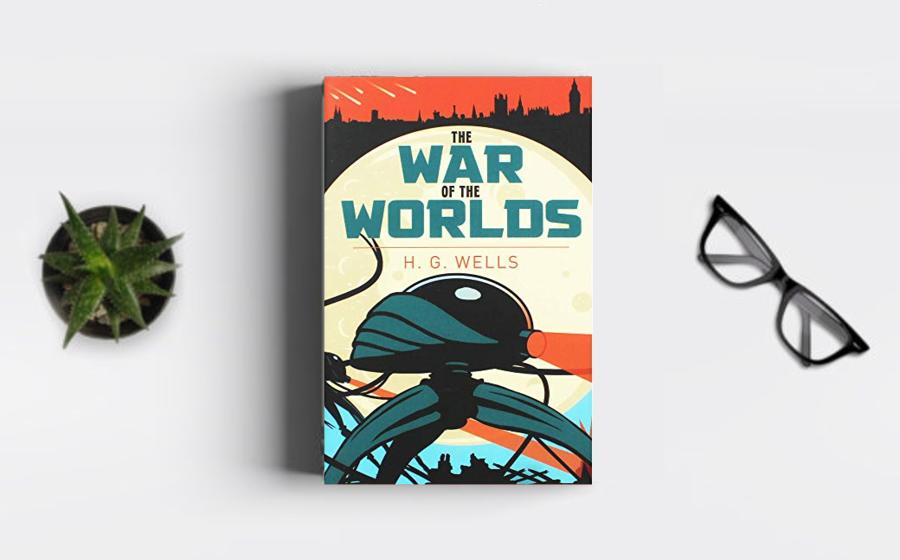"The War of the Worlds" stands as a seminal work that
transcends its era, leaving an indelible mark on the
genre and popular culture. This extraterrestrial epic,
first published in 1897, remains a testament to Wells'
visionary storytelling and his ability to tap into the
collective fears and imaginations of readers. As we
delve into the pages of this iconic novel, it becomes
evident that "The War of the Worlds" is not merely a
tale of Martian invasion; it is a profound exploration
of humanity's vulnerability, the consequences of
colonialism, and the enduring fascination with the
unknown. This literary classic rightfully claims its
place among the top books of all time, offering readers
a timeless narrative that continues to captivate and
resonate across generations.
At the heart of "The
War of the Worlds" is the sudden and ruthless invasion
of Earth by Martians. The narrative unfolds as colossal
tripods, armed with devastating heat-rays, wreak havoc
across the English countryside. Wells' portrayal of
Martian technology and the subsequent devastation
becomes a thematic focal point, a narrative device that
thrusts readers into a world where the seemingly
invincible are reduced to vulnerable refugees. In the
tradition of literary alien invasions, Mars becomes a
symbolic motif that adds layers of meaning to the
narrative, transforming the novel into an exploration of
humanity's vulnerability in the face of the unknown.
Wells' masterful depiction of the extraterrestrial
threat resonates with the literary tradition of
exploring the consequences of encounters with the
otherworldly. The novel's portrayal of Martian
technology and the ensuing chaos transforms "The War of
the Worlds" into a work that prompts readers to reflect
on the fragility of human civilization when confronted
with an advanced and alien force.
Wells delves
into the psychological impact of the Martian invasion,
capturing the collective fear and anxiety that permeate
society. In the tradition of literary explorations of
fear and the unknown, the novel becomes a thematic
tapestry that weaves through the psychological landscape
of its characters. The creeping dread, panic, and
disintegration of societal order become narrative
devices, inviting readers to empathize with the
characters' emotional turmoil and contemplate the
psychological toll of an extraterrestrial threat.
The exploration of fear and the unknown in "The War
of the Worlds" aligns with the literary tradition of
examining the human psyche under extreme circumstances.
Wells' insights into the psychological impact of
invasion add layers of complexity to the text,
transforming the novel into a work that not only
explores the physical threat of Martians but also delves
into the intricacies of human fear and resilience.
Wells' narrative extends beyond the immediate threat
of Martian invasion, serving as a critique of
colonialism and imperialistic tendencies. In the
tradition of literary examinations of colonial
oppression, the novel becomes a thematic undercurrent
that confronts the consequences of humanity's own
history of conquest and domination. The Martians, in
their relentless pursuit of Earth's resources, become
symbolic representations of imperial invaders, turning
the narrative into an allegory for the perils of
unchecked colonial expansion.
The colonial
critique in "The War of the Worlds" resonates with the
literary tradition of exploring the ethical dimensions
of conquest and the potential repercussions of
imperialistic endeavors. Wells' insights add layers of
meaning to the text, transforming the novel into a work
that not only tells a gripping tale of Martian invasion
but also prompts readers to reflect on the historical
context of colonialism and its impact on both the
invaders and the invaded.
As the Martian
onslaught progresses, the narrative shifts to focus on
humanity's resilience and ability to adapt. In the
tradition of literary examinations of survival, "The War
of the Worlds" becomes a thematic tapestry that explores
the tenacity of the human spirit in the face of
overwhelming odds. The protagonist's journey and the
stories of survivors become narrative devices, inviting
readers to contemplate the strength and adaptability
required for survival in the wake of extraterrestrial
devastation.
The theme of survival and adaptation
aligns with the literary tradition of exploring the
human capacity to endure and overcome adversity. Wells'
narrative adds layers of complexity to the text,
transforming the novel into a work that not only
presents a harrowing tale of invasion but also
celebrates the indomitable spirit of humanity when
confronted with existential threats.
"The War of
the Worlds" showcases Wells' scientific imagination,
offering readers a vision of Martian technology and
physiology that was groundbreaking for its time. In the
tradition of literary foresight, the novel becomes a
thematic undercurrent that highlights Wells' ability to
anticipate scientific advancements and speculate on the
possibilities of extraterrestrial life. The detailed
descriptions of the Martians and their war machines
transform the narrative into a work that not only
entertains but also stimulates the scientific
imagination of readers.
Wells' visionary legacy
in "The War of the Worlds" resonates with the literary
tradition of science fiction as a genre that pushes the
boundaries of scientific understanding and exploration.
The novel's impact on the popular imagination, inspiring
subsequent generations of writers, scientists, and
filmmakers, underscores its enduring significance within
the realm of speculative fiction.
"The War of the Worlds," it becomes evident that H.G. Wells' masterpiece is more than a tale of Martian invasion; it is a profound exploration of humanity's vulnerability, the consequences of colonialism, and the enduring fascination with the unknown. In the tradition of literary works that transcend their era, the novel stands as a testament to Wells' vision.






